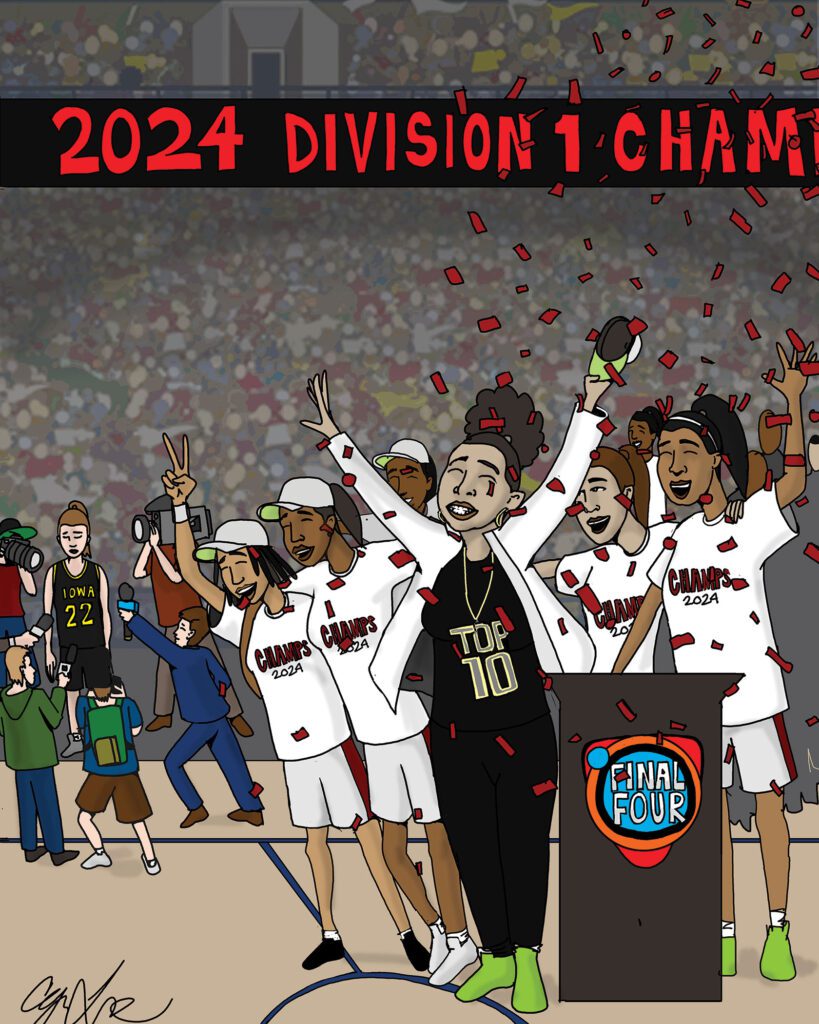
On Sunday night, the University of South Carolina Gamecocks women’s team completed a dream season by defeating the Iowa Hawkeyes 87-75 to win the NCAA championship. The team avenged last year’s loss to Iowa in the Final Four semifinal game.
The telecast broke records for women’s basketball (college or pro), with nearly 19 million viewers. Much of the fanfare was centered around Iowa point guard Caitlin Clark, who has broken multiple NCAA scoring records. The 6-foot Clark has been the poster child for the sport, appearing on multiple magazine covers and the subject of numerous stories, revitalizing the television audience with her scoring prowess.
For many people who have been watching the women’s game for years , there is a loud, “I told you so” refrain, pointing out that these games are as exciting as and maybe many times more exciting than the men’s games. One reason for this is that college women basketball players have to remain in college longer according to the WNBA rules requiring players to be at least 22, to have completed their college eligibility, to have graduated from a four-year college or to be four years removed from high school. This means that there are no “one and done” players leaving for the professional ranks like men’s college teams encounter year after year.
However, the achievements of the South Carolina women and their coach, Dawn Staley, seem to be an afterthought during their championship run. Coach Staley has an astounding 75-1 record in back-to-back seasons and is the only Black coach in Division One basketball to have an undefeated season and the only one to have three championship titles. Her mastery of the game is even more impressive when you look back on her playing days at the University of Virginia, where she led her team to the championship game and is the only woman to win the Most Outstanding Player of the tournament on a losing team.
With this resume, you would think that more love would come to her and her team. But many watching the game against Iowa felt that to the media, Staley’s team was the underdog. When the game ended, instead of first focusing on the celebration at the Gamecock sidelines, ESPN focused on Caitlin Clark shaking hands, and even followed her out through the tunnel. The next day, CNN came under fire for its coverage of the game, pointing out that USC went undefeated but noting that they beat Iowa in “the final college game for Hawkeyes star Caitlin Clark,” running a picture of a smiling Clark and her teammates.”
There is a long history in the NCAA of uneven treatment of woman athletes. It reflects the societal trend that in the past discouraged woman from taking part in physical activity. Despite this trend, in 1975, modifications to Title IX of the Education Amendment Act changed the landscape for women’s sports. New provisions required even budgets for playing fields, equipment and even access for all males and females in high school and college sports. Between 1971-72 and 2007-08, female participation in college sports nearly quintupled. Still, 50 years in, the NCAA recently came under fire over the lack of amenities, notably the workout equipment, at the women’s basketball tournament compared with the men’s event.
Overall, the trend towards better treatment of women athletes and their teams has increased opportunities for woman in college and professional sports. This has built wider interest, made women’s games more exciting to watch and has culminated in today’s record audiences for woman’s college basketball. In turn, this should also translate to a greater interest in the WNBA.
Still, there’s reason to believe women of color have not benefitted as much from Title IX. A report from the Women’s Sports Foundation, cited by the International Platform on Sport and Development, found that in schools where people of color are in the majority, girls have access to 67% of the athletic opportunities that boys do, while in predominantly white schools, girls see 82% of the athletic opportunities that boys do.
We are at a crossroads in our society, where we have to decide if we are going to go forward and protect woman’s rights or turn back the clock and try to suppress them. I hope this new rise in support for women’s competition in sports translates into support for women’s rights. I hope that the media, when covering woman’s sports, will honor all who deserve it with an equal lens.
Sports can inspire us all. Caitlin Clark is without a doubt a superstar and one of the best shooters in the game ever. But minimizing one team or individual’s success by focusing away from them in their moment of triumph can only hurt all women and the sport in general. I am hopeful for the opportunities this new day brings. Let’s move forward with a clean slate and leave our past prejudices in the past.
The champion Gamecocks players and their talented coach have been stars all along. People just didn’t realize it, until now.







